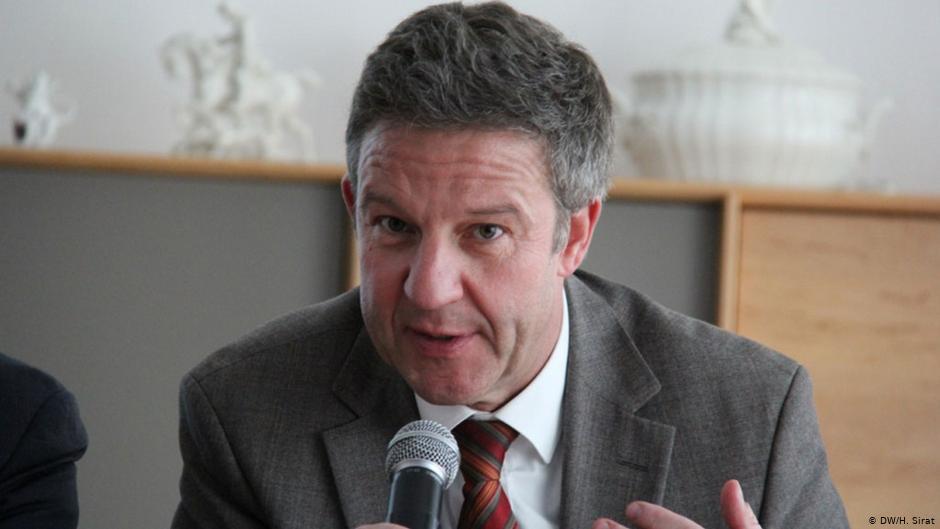KABUL (Pajhwok): The UN has urged the Islamic Emirate of Afghanistan (IEA) to fulfill its international obligations, including ensuring the rights to education and work for its population.
Markus Potzel, deputy Special Representative for the UN Secretary-General for Afghanistan, in an exclusive interview to Pajhwok Afghan News said it was up to the people of Afghanistan to carve out a pathway for their stable and prosperous future.
He also noted the de facto authorities, at the helm of power, had the responsibilities to listen to and fulfill the demands of their population. “Power comes with responsibility,” he believed.
When asked about poverty and unstable economic situation he said the responsibilities lie with the de facto authorities, the UN was only here to support.
The UN was committed to stay and deliver, but the de facto Taliban authorities must rescind bans and restrictions to enable UN to continue full support to the people of Afghanistan.
“It’s also relevant to state that we are finalizing a new UN Strategic Framework for Afghanistan, which outlines the range of activities the UN could carry out in Afghanistan between now and 2025 if the necessary enabling environment were provided by the de facto authorities.”
“The three priority areas identified are sustained essential services; economic opportunities and resilient livelihoods; and social cohesion, inclusion, gender equality, human rights, and rule of law.”
Referring to politicizing the aid process by telling its female staff not to report to their work he said that women were crucial for the implementation of humanitarian activities, including programmatic and distribution of assistance (including to women and children) and IEA decrees significantly impact this.
As said earlier, the decrees prohibiting women from working, including with the UN and its NGO partners, violate international rules and regulations that Afghanistan has subscribed to, this clearly was a political problem.
“We have been given no explanations by the de facto authorities for this ban and no assurances that it will be lifted. We as the UN continue to face a complicated situation in Afghanistan, operating with great difficulty, but doing our best to deliver.”
On the matter of the IEA government worldwide legitimacy Potzel said the issue of recognition was not up to the UN, the UN member states decide in this regard.
He also noted that these bans were negatively impacting the UN capacity to assist the people of Afghanistan.
He said there was no denying that the de facto authorities have made progress in a number of areas such as improved access due to lack of an active conflict, ban on opium cultivation, stable Afghan economy – albeit at a low equilibrium, combating corruption.
But, unfortunately, the raft of bans and other restrictions obscure some of these positive achievements. There was also a widespread concern that a lack of inclusivity and participatory governance would lead to instability.
“UNAMA is engaging with the Taliban on behalf of the international community on a daily basis. Members of the international community are also engaging within the Taliban,”
“UNAMA works according to the mandate provided by the Security Council. Both the Council and the Secretary-General have asked the UN to stay (Security Council resolutions 2678 and 2681).”
When asked about Afghanistan’s economic and political future, he said: “I don’t want to predict the situation one year on when we are already operating in an unpredictable and complex environment.”
“As I said before, the onus lies on the de facto authorities – about creating enabling conditions for us to operate in support of millions of needy Afghans.”
Potzel said: “We continue to work with donors and partners, and engage with national stakeholders in order to help Afghanistan improve its political and economic situation. That is why, we are here. But it does not only depend on us. Among others, it also depends on the international context, especially on donors’ willingness to provide funding.”
Referring to the UN operation in Afghanistan, Potzel said a number of IEA edicts severely restricting the civic and political space – including the denial of basic rights to Afghan women and girls, and the banning of Afghan women from working in national and international NGOs and the UN – has made our work extremely difficult.
He said the UN has acted as a bridge between the international community and Afghanistan. As mandated by the Security Council, we continue to engage with the Taliban de facto authorities in matters of human rights, inclusive governance, humanitarian access, and to promote an intra-Afghan dialogue.
In 2022 alone, amid a catastrophic humanitarian situation, UN humanitarian agencies and their partners delivered aid to 26.1 million Afghans in the areas of food and livelihood support, healthcare, sanitation and hygiene, assistance to refugees and internally displaced persons.
In 2023, between January and April, 17.3 million people were reached with some form of humanitarian assistance.
The recent bans on Afghan women working with the UN and its partners added yet another layer of complexity to what had already been an incredibly challenging operational and protection environment.
Accordingly, the 2023 Humanitarian Response Plan was revised in May to reassess initial planning assumptions and take into account changes to the context.
In total, considering the assistance already delivered and the planned response for the rest of 2023, humanitarian partners aim to reach a total of 22.3 million people (throughout 2023, including those assisted in the first half of the year), with a budget of $3.2 billion ($2.26 billion in new funding requirements from June to December, and $942 million already spent from January to May).
The current bans and restrictive measures have not been helpful. The low level of funding commitments from donors contributed to the scale down of this year’s UN humanitarian appeal from $4.6 billion to $3.2 billion.
In his message to the audience Potzel said: “We are here to support. Help us to help you!”







GET IN TOUCH
NEWSLETTER
SUGGEST A STORY
PAJHWOK MOBILE APP